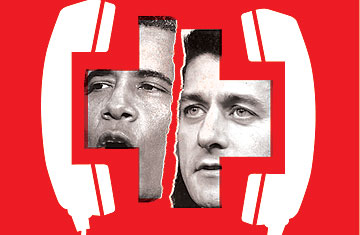
It was a delicious inside bit of politics: Bill Clinton and Congressman Paul Ryan having a private, backstage chat about Medicare, captured by an ABC News camera. Clinton says he's happy that the Democrats won the House special election in New York, but hopes his party doesn't use it as an excuse to "do nothing on Medicare." Ryan suspects that's exactly what is going to happen: "It's going to sink into paralysis." Clinton invites Ryan to give him a call. Ryan says he will.
Paul Ryan should make that call, for three reasons. First, he's right — serious Medicare reform is over for now (although cosmetic reform is possible as part of the coming debt-ceiling negotiations). Second, it's Ryan's own fault that it's over. His extreme privatization proposal gave the Democrats a sledgehammer with which to bash Republicans in the 2012 elections. Third, Clinton has extensive personal experience with what happens when politicians try to take the public somewhere it's not willing to go, and he also has had the near unique experience of sitting down with the opposition party and figuring out a way to balance the budget. Ryan, on the other hand, has been knocked silly by the chronic disease that afflicts latter-day American politics: the delusional hubris that accompanies victory.
Think about the past three years. In 2008, Barack Obama wins a smashing electoral victory, largely because the public believes he's a calm, cool adult who can lead the country out of an economic crisis. But for some crazy reason, he decides to focus much of his attention on passing a universal health care plan that has been the long-term dream of his party. This, despite polls that indicate nearly 80% of the public are satisfied with the health care they already have. The plan passes, but it's so complicated, the public isn't sure what's in it (and is wondering why the President hasn't focused similar attention on the economy), and Obama's party is clobbered in the 2010 elections.
Enter the Republicans. The public is still clamoring for economic relief. But for some crazy reason, the GOP, led by Ryan, decides to focus much of its attention on privatizing old-age entitlements, which has been his party's long-term dream. This, despite polls that indicate nearly 80% of the public love Medicare and don't want to see it changed. The Republican plan passes the House — and Ryan's party is defeated in a special election in a reliably Republican district, with the prospect of more seats to be lost in 2012.
All of which would appear to fly in the face of standard operating cynicism about American politics. Aren't politicians supposed to pander? Aren't they supposed to be pragmatic to a fault — focusing on short-term relief and eschewing serious, long-term problems like reforming the health care system and attacking structural deficits? Why, in a media atmosphere dominated by infotainers and telecharlatans, have our politicians suddenly gone all high-minded on us?
The answer is, they haven't. They just define "the public" differently than we do. Their public is smaller, and also plural. One of those mini-publics is their base: the diehards who show up for every primary and midterm election. Because of gerrymandering, those elections usually yield a crop of Congresspeople who reside on the left and right wings of their respective parties. And Congress itself constitutes a second, crucial public. If a President wants to get things done, he has to pay close attention to what the congressional members of his party want. And so Obama, who didn't even propose universal health care in 2008, finds himself enslaved by the desires of Nancy Pelosi and Henry Waxman. And John Boehner finds himself the servant of the Tea Party and hermetically sealed ideologues like Ryan. "It is a serious structural problem that has developed over the past 40 years," says William Galston of the Brookings Institution. "Both the electorate and the political parties are growing more polarized — but the parties have moved farther and faster to their respective sides of the spectrum than the public has." The result has been a series of public rebellions in reaction to ideological overreach by both parties.
There is a cure for this disease, but it's not high-minded. It is called politics, especially the sort of pragmatic politics Clinton practiced after he had his own hubristic, near-death, health care hallucination. It is an ugly process, involving compromise and small-time bribery for the public good — the slathering of pork on recalcitrant Representatives, the trimming of ideological sails. But it can work, even on an issue as fraught as Medicare. It is the reason why a newly enlightened Paul Ryan should pick up the phone.
